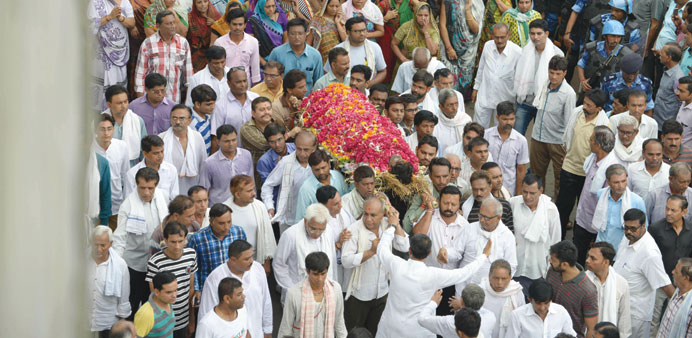Mourners and relatives attend funeral procession of Swetank Patel in the Babpunagar area of Ahmedabad yesterday. The funeral procession of Patel, 32, who allegedly died in police custody after being caught during the quota violence, was held amid huge force of police and paramilitary.
Agencies/New Delhi
A firebrand protest leader yesterday vowed to spread agitation over caste preferences nationwide, just days after the worst violence in more than a decade in Gujarat left nine people dead.
Hardik Patel said he was gathering support to hold protests in New Delhi and the northern city of Lucknow, after arriving in the national capital to meet leaders of various castes in India’s rigid social hierarchy.
“We will take the movement all over the nation and turn it into a country-wide movement,” the 22-year-old self-styled leader told reporters after landing from Gujarat.
“This is going to be a long fight.”
The government was forced to call in the army on Wednesday following riots and arson across Gujarat after a mass rally in the state’s main city of Ahmedabad turned violent.
Patel, who was briefly arrested, led the rally of an estimated half-a million people demanding special treatment for the Patidar or Patel caste.
The Patidars are one of Gujarat’s most affluent communities, but they say they are struggling to compete with less privileged castes for government jobs and university places.
India sets aside a proportion of jobs and places for Dalits and for other so-called “backward castes” and tribals under measures intended to bring victims of the worst discrimination into the mainstream.
But the policy of “reservation” causes resentment among other communities who say it freezes them out.
“We will mobilise this movement for all communities, not just the Patidars,” the Patidar Arakshan Andolan Samiti convener said.
“It (agitation) is a marathon and not a 100m race. It will go on for one-two years. I intend to bring 27 crore people of our community together which are in different states. I want to take our movement all over the nation. Wherever the Patel community needs me, I will go,” he said.
“During this time, if we feel the need for muscle power of the community, they will help us. And whenever required they will block the highways,” Patel said.
In his reference to 27 crore people, Patel was referring to related communities in other states like Kurmis and Gujjars.
He said he would support the Gujjar community in Delhi.
“Due to reservations, the country is 60 years behind. The government needs to give reservations to all the needy communities,” Patel said yesterday.
Patel skipped the funeral of Swetang Patel, who was killed allegedly in police custody after being picked up during the agitation in Ahmedabad, though he had said earlier that he would be present, and flew to Delhi yesterday morning.
He lashed out the Gujarat police for their action.
Asked about his views on political parties and leaders, he said: “We have never opposed any person, any political party or any community. We are fighting for our rights and it should be given to us.”
Asked about his photo with rightwing Vishwa Hindu Parishad leader Pravin Togadia, Patel said: “I have a photo with (Gujarat) Health Minister Nitinbhai Patel and many others. I run an organisation and many people from the BJP and the Congress come. So merely having a photo with anyone does not say anything.”
Local media said it was the first time the army had been deployed in Prime Minister Narendra Modi’s home state of Gujarat since communal riots in 2002 left at least 1,000 people dead.
Modi appealed for calm immediately after last week’s violence. The scale of the protest movement appears to have taken political leaders by surprise, after beginning earlier this year and rapidly gathering pace in recent weeks.
“Whatever happens to the land of Gandhi and Sardar Patel, the nation is shocked and pained first,” Modi said.
Gujarat Chief Minister Anandiben Patel had turned down the Patel community’s demand, since Gujarat has already hit a 50% cap on reservation, a limit imposed by the Supreme Court.

